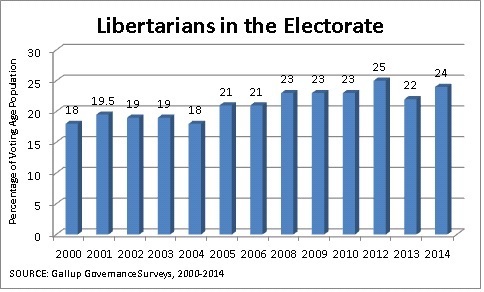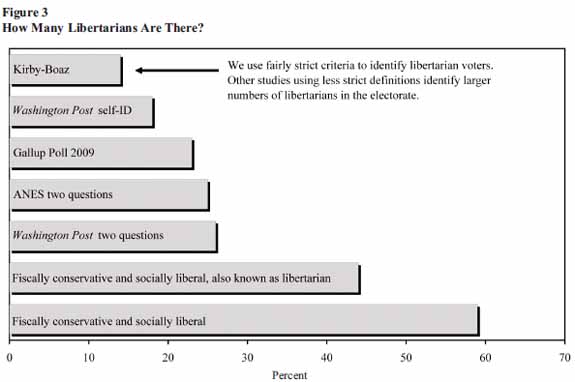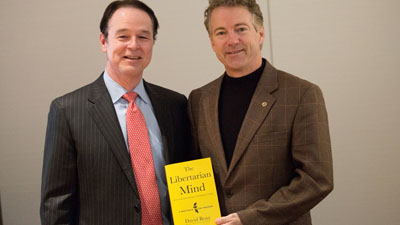David Boaz discusses his book, The Libertarian Mind, at The Commonwealth Club of California
Posted on April 9, 2015 Posted to Cato@Liberty
Paul Krugman Can’t Find Any Libertarians
Paul Krugman has a blog post at the New York Times that seems to be based on no research at all. But it has a snappy four-cell matrix so you’ll know it’s like real economics.
Krugman’s argument is that “there basically aren’t any libertarians.” And here’s the graph that proves it:

See how small the letters are in two of the boxes? That shows you that there aren’t any people in those boxes. “There ought in principle, you might think, be people who are pro-gay-marriage and civil rights in general, but opposed to government retirement and health care programs — that is, libertarians — but there are actually very few.” And there are also very few people who are “socially illiberal” and supportive of government social programs, he says.
But you know, there’s research on this. David Kirby and I have done some of it, in studies on “the libertarian vote.” But two political scientists examined a similar matrix back in 1984 and found roughly even numbers of people in each box.
Part of the trick here is that Krugman has used a vague term, “socially liberal,” for one of the dimensions of the matrix, and a radical policy position, “no social insurance,” for the other dimension. The logical way would be to use either common vague terms for both dimensions – say “socially liberal/conservative” and “fiscally liberal/conservative” – or specific and similarly radical terms for both dimensions, something like “no social insurance” and “repeal all drug laws.” Wonder how many people would be in the boxes then?
“No social insurance” is a very radical position. Even many libertarians wouldn’t support it. Like Hayek. So to find the divisions in our society, we might choose a specific issue of personal freedom – gay marriage, say – along with an equally controversial economic policy such as school choice or a constitutional amendment to balance the budget.
If you use either set of dimensions, it’s pretty clear that you’re going to get substantial numbers of libertarians (broadly speaking) and also of those incongruous creatures Krugman can only call “hardhats.” Libertarians often call people who support substantial government intervention in both economic and personal issues “statists” or authoritarians. In our studies we call them populists, as does the Gallup Poll.
The media constantly discuss politics in terms of liberals and conservatives, so very few voters are even familiar with the term libertarian (or populist) and thus few choose it to describe themselves.
It is of course true that the number of “real” libertarians – people who read Hayek and Nozick and Rothbard, or Reason magazine, or indeed The Libertarian Mind – is small. Maybe a few hundred thousand? (Though Hayek was selling pretty well when the government created a financial collapse and responded by bailing out Wall Street.) Maybe a few million if you include Ayn Rand? But it’s also true that there aren’t many conservatives if you mean people have read The Conservative Mind, and not many liberals if you mean people who read John Rawls and Paul Starr.
The question for politics, which is where Krugman started, is how many people there are who hold broadly libertarian views, or views that diverge from liberal and conservative approaches in a libertarian direction. That’s what pollsters try to measure. For more than 20 years now, the Gallup Poll has been using two questions to categorize respondents by ideology:
Some people think the government is trying to do too many things that should be left to individuals and businesses. Others think that government should do more to solve our country’s problems. Which comes closer to your own view?
Some people think the government should promote traditional values in our society. Others think the government should not favor any particular set of values. Which comes closer to your own view?
Here’s a graphic depiction of the number of respondents who gave libertarian answers to both questions in the Bush-Obama years:

The Pew Research Center and the American National Election Studies also ask such questions, and in our studies on the libertarian vote we have drawn on all those data sets. By using narrower criteria than Gallup does, mostly by adding a third question, we found that 13 to 15 percent of Americans hold libertarian attitudes. In 2006 we commissioned Zogby International to ask our three ANES questions to 1,012 actual (reported) voters in the 2006 election. We asked half the sample, “Would you describe yourself as fiscally conservative and socially liberal?” We asked the other half of the respondents, “Would you describe yourself as fiscally conservative and socially liberal, also known as libertarian?”
The results surprised us. Fully 59 percent of the respondents said “yes” to the first question. That is, by 59 to 27 percent, poll respondents said they would describe themselves as “fiscally conservative and socially liberal.”
The addition of the word “libertarian” clearly made the question more challenging. What surprised us was how small the drop-off was. A healthy 44 percent of respondents answered “yes” to that question, accepting a self-description as “libertarian.” We summed all that up in this handy but not necessarily helpful graph:

All these numbers are open to debate, of course. Do these views affect how people vote? I think our studies on the libertarian vote present evidence that they do. But I’m sorry that Paul Krugman didn’t do a Google search on “how many libertarians” before dashing off his post.
Krugman says there just aren’t many people who hold views that cross red/blue, liberal/conservative lines, who believe in, say, both gay marriage and lower taxes, or oppose both marijuana legalization and free trade. That is, there are no people who are, as he puts it, “socially liberal” but also “fiscally conservative.” In the real world, of course there are. It’s not hard to find them in polls, or by talking to people. Are they just inconsistent? Or might they have broadly libertarian views (or broadly pro-government views)?
If all this data doesn’t impress Krugman, maybe he’ll accept Radley Balko’s scientific analysis:
Libertarians are like dark matter. There may be no direct proof we exist, but you can infer us due to how we affect Alternet & Salon.
I don’t think a Princeton professor would give this paper a passing grade.
Posted on April 9, 2015 Posted to Cato@Liberty
David Boaz discusses Rand Paul’s campaign on WNYC’s The Brian Lehrer Show
Posted on April 8, 2015 Posted to Cato@Liberty
David Boaz discusses his Newsweek op-ed on Rand Paul’s campaign on Sirius XM’s Stand Up! With Pete Dominick
Posted on April 8, 2015 Posted to Cato@Liberty
David Boaz discusses Rand Paul’s campaign on Newsmax’s MidPoint with Ed Berliner
Posted on April 7, 2015 Posted to Cato@Liberty
David Boaz discusses Rand Paul’s campaign on EWTN’s News Nightly
Posted on April 7, 2015 Posted to Cato@Liberty
Can Libertarian-Leaning Rand Paul Really Win the GOP Nomination?
Sen. Rand Paul has officially announced he’s running for president. But can a libertarian-leaning candidate win the Republican nomination and ultimately the presidency?
In a political world dominated by the liberal-conservative divide, there are many doubters. But there’s growing evidence that Paul can broaden the Republican base and appeal to the broad center of the electorate.
The Republican base may be divided into establishment, tea party, Christian right, and libertarian wings. Paul starts out with a strong base in the libertarian wing, which gave his father, Rep. Ron Paul, 21 percent of the Iowa caucus vote and 23 percent of the New Hampshire primary in 2012. With his strong opposition to taxes and spending and his book “The Tea Party Goes to Washington,” he’s also well positioned for the tea party vote. His pro-life views will make him acceptable to religious conservatives as the field narrows.
“Rand Paul is trying something different in a Republican presidential race.”
The wild card may be who can attract voters who don’t usually vote in Republican primaries. Paul’s stands on military intervention, marijuana, criminal justice reform, and the surveillance state give him a good shot at getting independents and young people to come out for him.
The race could come down to former Florida governor Jeb Bush as the establishment candidate against the last standing insurgent candidate, and Paul is, as pundit Peter Beinart wrote recently, “as bold as any reformist in the race.”
Political observers usually talk about liberals, conservatives, and moderates. But not all voters fit into those boxes. Every year Gallup divides the public into liberal, conservative, libertarian, and populist. In the 2014 survey the firm classified 27 percent of respondents as conservative and 24 percent as libertarian. Paul has the libertarian field all to himself.
Indeed, a 2006 Zogby poll for the Cato Institute asked respondents, “Would you describe yourself as fiscally conservative and socially liberal?” Fully 59 percent said yes, and only 27 percent said no. That’s a huge untapped market for a candidate who can cut across red-blue barriers.
Events of the past few years have pushed voters in a libertarian direction, causing some observers to talk about a “libertarian moment” in American politics. The financial crisis, the Wall Street bailouts, the $18 trillion national debt, and Obamacare created the tea party. The revelations about spying and surveillance since 2013 have caused grave concerns about privacy. Less traumatically, growing support for gay marriage and marijuana legalization shows the strength of libertarian attitudes in a country founded on the inalienable rights of life, liberty, and the pursuit of happiness.
The small band of neoconservatives who dominate conservative punditry have tried to ignore or dismiss Paul’s chances on the grounds that his mildly non-interventionist foreign policy will make him unacceptable to Republican voters. They need to read more polls. Last June 75 percent of Americans, and 63 percent of Republicans, told CBS News/New York Times pollsters that the Iraq war wasn’t worth the costs. Seventy percent of Republicans opposed military action in Syria. A massive Pew Research Center survey in December 2013 found that 52 percent of respondents, the highest number ever, said the United States “should mind its own business internationally and let other countries get along the best they can on their own.”
The brutal rise of the Islamic State has made many Americans, including more Republicans, more hawkish. But nine months from now, when Republicans start voting in Iowa and New Hampshire, they’re likely to be tired of endless wars and to notice that 15 years of military intervention under President Bush, President Obama, and Secretary of State Clinton have left the Middle East in chaos. As the only skeptic about promiscuous intervention running in the GOP primaries, Paul has a chance to gain support from the war-weary.
Rand Paul is trying something different in a Republican presidential race. He yields to no other candidate in his opposition to taxes, spending, debt, regulation, and Obamacare. But he also talks to Silicon Valley about government spying, and African-American audiences about racial bias in the drug war, and college students about both.
After the 2012 election Los Angeles Times columnist James Rainey wrote that the country is mildly “left on social issues and right on economics…. a center-libertarian nation.”
No other candidate is trying to appeal directly to that center-libertarian vote. That’s the big new idea that Rand Paul will test.
Posted on April 7, 2015 Posted to Cato@Liberty
David Boaz discusses Rand Paul’s campaign on NPR’s Morning Edition
Posted on April 7, 2015 Posted to Cato@Liberty
Rand Paul’s Challenge: Can a Libertarianish Candidate Succeed?
 As Sen. Rand Paul announces his presidential candidacy, I’ve been talking about it in the media. At the Daily Beast, I write about his chances:
As Sen. Rand Paul announces his presidential candidacy, I’ve been talking about it in the media. At the Daily Beast, I write about his chances:
The Republican base may be divided into establishment, tea party, Christian right, and libertarian wings. Paul starts out with a strong base in the libertarian wing, which gave his father, Rep. Ron Paul, 21 percent of the Iowa caucus vote and 23 percent of the New Hampshire primary in 2012. With his strong opposition to taxes and spending and his book “The Tea Party Goes to Washington,” he’s also well positioned for the tea party vote. His pro-life views will make him acceptable to religious conservatives as the field narrows.
The wild card may be who can attract voters who don’t usually vote in Republican primaries. Paul’s stands on military intervention, marijuana, criminal justice reform, and the surveillance state give him a good shot at getting independents and young people to come out for him….
After the 2012 election Los Angeles Times columnist James Rainey wrote that the country is mildly “left on social issues and right on economics…. a center-libertarian nation.”
No other candidate is trying to appeal directly to that center-libertarian vote. That’s the big new idea that Rand Paul will test.
At Newsweek (no longer part of the same company as the Daily Beast!) I write about Paul’s libertarianish views:
He told a Harvard audience that he’s “libertarian-ish” and wants “a libertarian influence in the Republican Party.” He told Sean Hannity on Fox that he’s happy to be called “either libertarian conservative or constitutional conservative.”…
His recent comments on gay marriage—“personally offended” and “moral crisis”—created a libertarian backlash. Unlike Paul, most libertarians support abortion rights. But voters for whom abortion and gay marriage are deal-breakers aren’t likely to be voting in Republican primaries.
Many libertarian activists have vociferously objected to Paul’s foreign policy moves. His endorsement of U.S. airstrikes against the Islamic State (ISIS), his signing Senator Tom Cotton’s letter aimed at derailing negotiations with Iran and his endorsement of a $190 billion increase in Pentagon spending (with cuts in other spending to pay for it) reinforced his libertarian opposition.
But conservative writer Michael Brendan Dougherty says libertarians should understand that Paul is “inching” the GOP in his direction: “Paul often offers rhetorical hostility instead of sanctions, sanctions instead of conflict and limited constitutionally authorized conflict instead of open-ended war.” Sort of a Fabian approach to non-interventionism….
Paul doesn’t claim to be a libertarian, and he takes positions that many libertarians disagree with. But on a broad range of issues, from spending and regulation to government spying, drug wars and military intervention, he has a more libertarian policy agenda than any major candidate in memory.
I told Mara Liasson at NPR something similar:
“I think Rand Paul is the most libertarian major presidential candidate that I can remember seeing,” said Boaz, whose new book is called The Libertarian Mind, “so it tells you that there is a constituency that wants this more libertarian approach.”
Al-Jazeera did a nice summary of a point I made:
Boaz too said that Rand Paul’s candidacy represents an inflection point for the libertarian movement, with an increasing number of voters attracted to a political philosophy that is skeptical of Big Government in the wake of Wall Street bailouts, the Iraq War and the abuses of the NSA. Paul’s campaign will test how far libertarian ideas can go in the Republican Party.
Posted on April 7, 2015 Posted to Cato@Liberty
David Boaz discusses his book ‘The Libertarian Mind’ on KGO’s The Ronn Owens Show
Posted on April 6, 2015 Posted to Cato@Liberty



